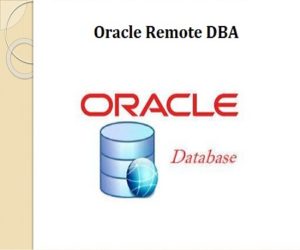What A Typical Day of an Oracle Remote DBA Looks Like
For most people, a typical day in the office starts with the daily commute and grabbing the first of the endless cups of coffee. However, very rarely does the day of a remote DBA ever start like this. This is simply because the remote DBA team’s job has no real beginning or end; the work continues 24×7. The nature of the database administration services required by clients spread over different time zones necessitates DBAs to be always in tune with their dynamic environments. Truly speaking, no other job can come near remote database administration in the sheer unpredictability of service demands.

Monitoring Alerts
Normally, you can expect the DBA to clock in and begin checking his inbox for alerts that may have been generated due to problems occurring in the night. The necessary action for these incidents will have to be included in the list of the day’s work that may already have been prioritized. The overnight alerts will typically be issued with backups that may have potentially failed; limitations of hard disk space, reports that are not getting fired automatically, or other such issues that have been identified by the monitoring agents of the remote DBA agency. The advantage of having a monitoring team in the remote database administration is that that they can take care of the daily tasks, which while being essential, consume a lot of time. With the intervention of the monitoring agents, the remote DBAs are able to better focus on the most complex issues in client accounts. The database administrators are able to prioritize their daily work schedule better with the inputs provided by the monitoring agents.
Work Prioritization
The key to successful database administration is being able to organize and prioritize the work that has to be done. With every DBA having to manage multiple clients, there is a need to identify tasks that need to be executed immediately while also allotting sufficient time to work with clients so that the efficiency and performance of their databases are enhanced. Once the tasks have been scheduled, the database manager is informed of the details of which DBA will be doing what work for the day so that accountability and responsibility are clearly fixed for the day. All database issues that have been identified by the monitoring are then systematically addressed and the client notified whenever the solution is implemented if so required. Once the urgent concerns have been addressed, the Oracle remote DBA then will need to prepare for scheduled client meetings.
Customer Meetings
The preparation for scheduled customer meetings will obviously depend on what has been planned for discussion. The clients may have issues with the performance of the database, the daily metrics, or even new reports with more information. Clients could also be concerned with the long-term planning and how they need to rise to the occasion of changing marketplace dynamics. These would require the meetings to focus on recent progress as well as the strategic implementation of the database besides things to do for upcoming projects. Remote DBAs effectively are thus an integral part of the IT teams of customers and have the power to not only customize the customer interaction but also the contact modalities according to the preferences of each client. This enables prompt responses by the primary or secondary DBA over email, text messages,or voice calls.
While meetings can progress all the day, the DBA team continues to address issues that have been prioritized earlier as well as well as undertake long-term projects. Even before these tasks are completed there could be urgent tickets appearing in the monitoring system, which will need to be handled simultaneously. If the primary DBA is engaged then these emerging situations are handled by the secondary DBA and rest of the DBA team.
Conclusion
It is evident that remote database administration needs to deal with tasks of varying levels of importance on a daily basis and also continue to perform database tuning for each customer for enhancing performance levels. A successful remote DBA will need to not only have technical skills but also be adept in work organization and prioritization, and interpersonal skills. The ability to multitask between different projects and to work very long and erratic hours is something that is essential for remote DBAs to thrive.



